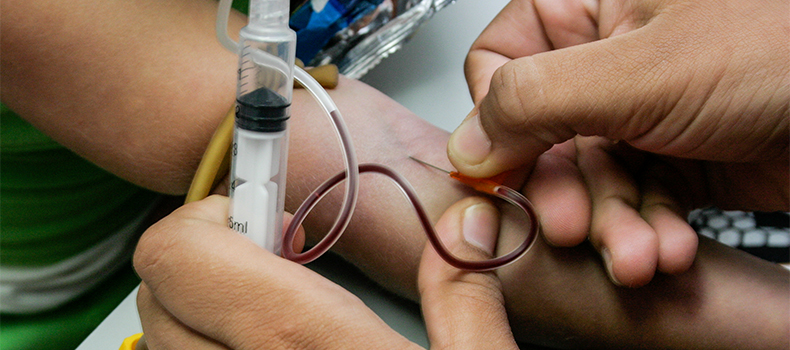Phlebotomy Courses
What You’ll Learn in Phlebotomy Courses
Phlebotomy is more than just taking blood. Phlebotomy courses, in addition to teaching collection techniques, prepare you for emergencies and help you understand proper laboratory procedures in order to avoid contamination or infection of yourself and others. Accredited phlebotomist technician programs will teach you all of the necessary techniques and procedures you’ll need to be a competent and skilled phlebotomist.
Common Training Classes
Some of the subjects you can expect to see in phlebotomy courses are:
- Anatomy and physiology – This includes the circulatory, lymphatic, respiratory, urinary, and muscular and skeletal systems.
- Blood and cell composition – Understanding how blood and cells are affected by infection and disease is at the crux of the phlebotomy field.
- Blood sampling procedures – Venipuncture, or vein puncture, is handled differently for different people. Newborns, children, adults and the elderly all have veins that require different techniques.
- Laboratory safety – Understanding how to safely handle lab equipment and clean up spills are key in keeping yourself and your co-workers protected from infection and physical harm.
- CPR – Lots of things can happen on the job. Being prepared with a CPR certification is a good idea. More phlebotomy courses are including CPR training in their curriculum.
Choose the Right Training Program
Once you’ve decided to get phlebotomy training, choosing the right school is the next step. Defining your priorities is a good place to start. Finding the right phlebotomy training program can be easy when you know what’s most important to you.
Here are some things to consider:
- Location – How important is it to find phlebotomy training close to home? If you’re willing to move to attend school, it may not be much of an issue for you. But if you’re looking for a campus within easy commuting distance, that will narrow your options.
- Time to completion – Phlebotomy training programs vary in length, from one semester to one year. Whether you need a flexible schedule and how fast you want to enter the workforce may determine which program length will work best for you.
- Accreditation – When you attend an accredited phlebotomy training school, you can be sure that your education meets the high standards required to get your certification and start your career. Accreditation will also enable you to apply for federal financial aid programs. Look for accreditation by the National Accrediting Agency for Clinical Laboratory Sciences when you research programs.
In The News
What is a Phlebotomist?
Phlebotomy Courses
How Much Does Phlebotomist Training Cost?
What Customers Are Saying
Kind, Quality Examiner
The insurance examiner was incredibly skilled at drawing my blood, making the process as quick and painless as possible. They were also very thorough in conducting my exam, taking the time to answer all of my questions and address any concerns I had. Throughout the entire process, the insurance examiner demonstrated a high level of attention to detail and a commitment to providing the best possible care. Their expertise and dedication are a true testament to their professionalism and commitment to their patients. Overall, I would highly recommend this insurance examiner to anyone looking for a knowledgeable, caring, and skilled healthcare professional. Thank you for providing such exceptional care and service!
Benjamin
Wonderful Experience
I recently had the pleasure of being examined by Simon, an insurance examiner who drew my blood and conducted a thorough exam. I must say, I was thoroughly impressed with Simon's professionalism, expertise, and compassionate approach throughout the entire process.
Marjorie
Comes Highly Recommended
During the blood draw, the examiner took the time to explain the process, making sure I was comfortable and at ease throughout. Their skillful technique made the process quick and painless, and they made sure to handle my sample with care and precision.
Stephanie
This is a great site
I just want to let you know, this site makes it so much easier to have our exams completed. it's so much easier to navigate. Super user friendly
SS
Very Warm and Welcoming
The examiner was very warm, welcoming, and made me feel completely at ease throughout the entire process. Their kind and caring approach made the experience far more pleasant than I had anticipated, and left me feeling grateful for their expertise and kindness.
Karen
Great experience
Thank you! BTW feedback from client was ‘ the exam went great – he was very friendly and professional!
TF
Terms of Use Privacy Contact |
 |
©2026 Express Plus Examiners All Rights Reserved |

